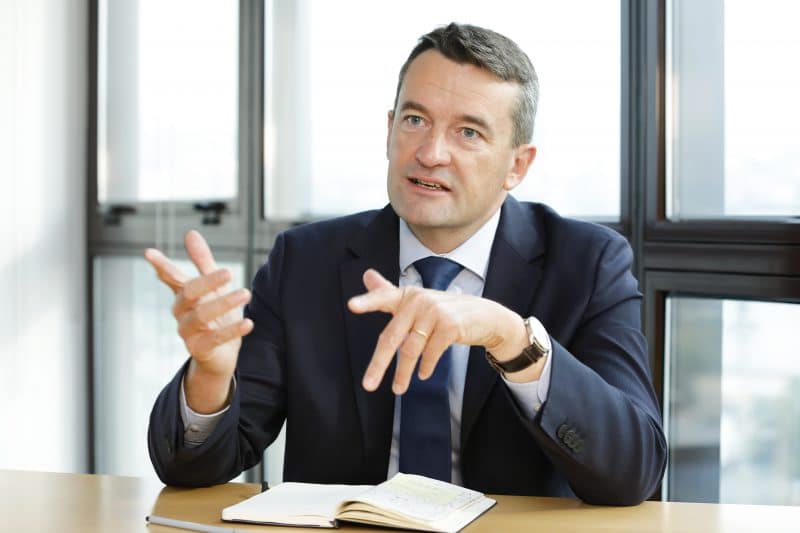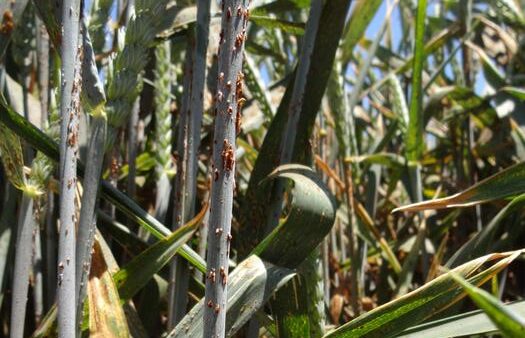After its Monsanto takeover, life has not been all roses and sunshine for Bayer. With shareholders grumbling, glyphosate trials and the neonics ban, I had many questions. So, I asked Bruno Tremblay, who is Head of Bayer Division Crop Science for Europe Middle East Africa (EMEA) for his take on some of these controversial issues.
European Seed (ES): Bruno, today, where do you see major challenges in EU policy making with regards to agriculture and the seed sector?
Bruno TREMBLAY (BT): Agriculture has become a very emotional space to tackle and to address. At Bayer we welcome and embrace these emotions; we listen, indeed but we try to focus the debate on facts and science-based elements. The reconciliation of civil society with science goes far and beyond the seed sector, the major challenge we see today, impacting all spheres of policy making in the agricultural space. Transparency – that Bayer fully supports – is certainly a value and a tool that policy makers are holding to restore trust but, alone, is not enough. A change is needed in the way we tackle policy making in the EU: a proper and proportionate communication on risks needs to be implemented and subsequently boosted for innovation to be unfold in the EU agricultural sector. Our farmers deserve to have the same competitive toolbox with peers in other countries: it is a collective responsibility to make sure that consumers and civil society as a whole are equipped with sound and science-based elements to make their own informed choices. Bayer is playing its part on that alongside with stimulating dialogue, better coordination and alignment of the seed industry with the food and feed chain operators. Policy making in the EU cannot continue to be dealt with in ‘silos’: agriculture should be approached holistically.
[tweetshareinline tweet=”Transparency – that Bayer fully supports – is certainly a value and a tool that policy makers are holding to restore trust but, alone, is not enough.” username=”EuropeanSeed”]
ES: How do the current Intellectual Property regimes available in Europe influence Bayer’s ability to innovate?
BT: In order to protect and provide a fair return on our significant investment of 5.2 Billion Euros in innovation in 2018, we support the implementation in all countries of a robust and transparent legal framework for the protection of Intellectual Property Rights (IPR’s) related to plant-based inventions. We believe such laws encourage investment in innovation, new products and technologies and benefit farmers and society in the long term.
Bayer is aware of concerns that are expressed with patent protection for plants, seeds and traits and believes the benefits of patent protection should be balanced by providing transparent access to commercial varieties as a basis for further breeding. In this respect, Bayer has supported the introduction of a limited breeder’s exemption in European patent laws that allows breeding with commercial varieties covered by patents provided that newly developed varieties that contain a patented trait or technology can only be commercialized if a commercial license from the patent holder is in place.
We contribute to the PINTO database administered by Euroseeds (formerly the European Seed Association) which alerts plant breeders as to which patents are relevant with regards to individual commercial varieties and; we have an e-licensing platform for vegetable traits. In the meantime, we actively encourage industry-wide discussions to address any remaining concerns.
ES: How does the Access to Seeds Index support the contributions of seed companies to small holder farmers? How could the Index improve?
BT: Bayer fully recognizes the needs of smallholder farmers and their communities, especially in regions with underperforming agricultural systems. We recently announced our intention to empower more than 100 million smallholder farmers and their families in developing countries resulting in more robust and resilient agricultural systems.
[tweetshareinline tweet=”Bayer intends to empower more than 100 million smallholder farmers and their families in developing countries resulting in more robust and resilient agricultural systems.” username=”EuropeanSeed”]
We believe that the Access to Seeds Index methodology will develop further to better reflect the reality and complexity of the seed industry – and the business models of smallholder farming in critical geographies.
Bayer has actively engaged in the Access to Seeds Index since it was first proposed to the seed industry by the Netherlands based NGO in 2013. Our experience is also based on contributions to the Access to Medicines Index introduced in 2008. Both indexes are an opportunity for companies to demonstrate their contributions toward specific goals as ranked and assessed through the index methodologies, which continue to evolve over time.
Access to Seeds is now part of the World Benchmarking Alliance (WBA) which is measuring and incentivizing business impact towards achieving the UN Sustainable Development Goals. The WBA is currently preparing a new Food and Agriculture benchmark involving over 300 companies. In this new Index, ten of the highest revenue companies from both fertilizers, agrochemicals and seed suppliers were selected to be included. WBA will publish further details on the benchmark’s methodology and begin its baseline in 2020 (see www.worldbenchmarkingalliance.org).
ES: What is Bayer doing as a result of the ECJ ruling on plant breeding innovation last year?
BT: Bayer, together with the European plant breeding sector, considers the consequences of the ECJ ruling to be damaging not only for breeders, but for the EU agri-food chain and for society at large.
Together with industry, we will continue to work with the scientific community, authorities and society at large to focus on sensible, science-based approaches that allow developers to bring needed solutions to farmers and consumers.
Bayer recently made a call on the EU’s new commissioners to form and steer an inter-institutional, cross functional platform where stakeholders and civil society can discuss how to introduce innovation with proportionate and science-based regulation in Europe. We firmly believe that only a dialogue driven by principles such as safety, transparency and sustainability can result in a sensible policy outcome in the EU.
ES: Since the neonicotinoids (neonic) ban in 2018, farmers have had to find alternatives to protect crops such as oilseeds. What are some of the consequences?
BT: We must recognize that farmers, irrespective of prevailing political agendas or public opinion, need to protect their crops in order to protect their livelihoods – and to protect our food supply. They only use authorized products in an approved way. Nevertheless, without the neonics, they need to apply alternative products more frequently by spraying; versus a single seed treatment, and there are inevitably consequences, even if these are deemed as acceptable risks. In some cases, the consequences will lead to extra costs, more CO2 emissions, or less effective control, or a higher (even if still “acceptable”) risk to the environment, biodiversity, public, etc. In some cases, farmers have simply stopped growing the crops they grew before and changed the uses of their land because they still must protect their livelihood. We feel that decisions that affect our agricultural productivity are best taken within a more holistic perspective that considers the consequences and impacts of such decisions on European agriculture.
[tweetshareinline tweet=”Without neonics, farmers need to apply alternative products more frequently, leading to extra costs, more CO2 emissions, less effective control & a higher risk to environment, biodiversity & the public.” username=”EuropeanSeed”]
We need to recognize and balance the benefits of using pesticides with the risks that they bring and consider the impact of losing a specific tool versus the risks of keeping it. Moreover, prioritizing the introduction of specific controls on where and when it can be used, rather than simply banning it. We also need to recognize that Europe has vastly different climatic and agronomic conditions across the geographies of different Member States. A particular pesticide, or plant protection product, may not be needed in one country, but it is enormously valuable on certain specialty or minor crops in another. We need to move towards an agenda that aims to provide the best options including the safety profile, as well as considering agronomic, social and economic consequences for farmers wherever they are.
ES: The regulatory environment around glyphosate is quite challenging at the moment; how are the US verdicts impacting the EU market?
BT: In the EU, a five-year re-registration was granted in December 2017 after thorough and extensive evaluation of the scientific characteristics of glyphosate. Since the registration of glyphosate granted in 2017 will expire on 15 December 2022, the process for renewal must begin in December 2019, i.e. 3 years before the current expiry. We trust the regulators to decide responsibly and based on scientific findings, including the European Commission and in the Member States. The juries’ decisions do not change the rigorous scientific research and data on glyphosate and glyphosate-based herbicides that confirm that these products are safe when used as directed and that glyphosate is not carcinogenic. Since the IARC publication, on which plaintiffs based much of their case, numerous regulatory agencies [including the U.S. EPA, European Food Safety Authority (EFSA), European Chemicals Agency (ECHA), the German Federal Institute for Risk Assessment (BfR), and Australian, Canadian, Korean, New Zealand and Japanese regulatory authorities, as well as the Joint FAO/WHOMeeting on Pesticide Residues (JMPR)], have reaffirmed that glyphosate-based products are safe when used as directed and that glyphosate is not carcinogenic. We are convinced that we have good arguments for a renewed approval of glyphosate beyond 2022.
ES: What is wrong with the current outcomes of the glyphosate verdicts? And why do the judges and juries form different conclusions in comparison to the majority of scientific evidence?
BT: The verdicts so far, all of which face appeal and none of which are final, conflict with the rigorous scientific research and data on glyphosate and glyphosate-based herbicides that confirm that these products are safe when used as directed and that glyphosate is not carcinogenic. Moreover, the IARC publication, on which plaintiffs base much of their case, remains a notable outlier. Since IARC’s monograph was published in 2015, numerous regulatory and scientific agencies including the U.S. EPA, European Food Safety Authority (EFSA), European Chemicals Agency (ECHA), German BfR, and Australian, Canadian, Korean, New Zealand and Japanese regulatory authorities, as well as the Joint FAO/WHO Meeting on Pesticide Residues (JMPR), have reaffirmed that glyphosate-based products are safe when used as directed and that glyphosate is not carcinogenic. Of note, in April 2019, the U.S. EPA issued its proposed interim registration review decision on glyphosate and reaffirmed that “there are no risks to public health when glyphosate is used in accordance with its current label and that glyphosate is not a carcinogen.”
We don’t know precisely why juries reached the verdicts they did or what particular evidence they found persuasive. That said, there is a very significant contrast between the scientific evidence reviewed by expert regulators across the world – who have looked at the full body of science over 40 years in reaching the conclusion that glyphosate is not carcinogenic. On the other hand, juries are limited in the number of studies they see, and some of the evidence presented in court is unreliable, such as epidemiology studies that do not control for other pesticides. It is important to note that of the three trials to date, IARC’s opinion was admitted in every one while evidence of worldwide regulatory support for the safety of glyphosate was limited in every case.
It’s also important to remember that we are still in early days with this litigation, and none of these verdicts are final. As is the case with mass tort litigation in the U.S., there is still a lengthy appeals process for each of all three cases that needs to play out. There are several critical legal issues that cut across these cases that will be assessed at the appellate level. We have strong arguments on each of these issues, and rulings in our favor on any one or more of these would potentially have a significant impact on all of these cases. For example, we do not believe the flawed, cherry-picked studies presented to the jury by plaintiffs are sufficient to meet their burden to prove that our herbicides caused the plaintiffs’ Non-Hodgkin lymphoma given that most NHL has no known cause, the plaintiffs had numerous risk factors for the disease, and exposures were limited. In our appeals and in future cases, we are going to continue our efforts to exclude, limit, or if necessary, help juries see past this unreliable science.
We continue to believe that the extensive body of science behind the safety of our glyphosate-based herbicides confirms these products are not carcinogenic and will ultimately be determinative in the litigation.
Editor’s Note: Bruno TREMBLAY is Head of Bayer Division Crop Science for Europe Middle East Africa (EMEA)













